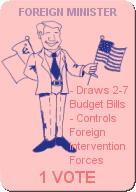So I have several friends who build/design games, of the table-top, videogame, and card varieties (the gents of Sancho Games, D&D writers, the maker of Chronotron, and folks who work for Sony, Irrational, and Bethesda). One of these games is Junta.
 Junta – as it has been doctored (rather extensively) to transform it from a rather banal board game into an online turn-based game – is a game-based study in leadership. The premise is that all the players are government officials in a banana republic. Each player assumes a character persona through which they conduct business, engage in negotiations, and post speeches. They begin by electing a President, who selects their cabinet positions (negotiations are encouraged), proposes a budget for all the players, and so on. Players have the capacity to coup against the President if they don’t like the way things are going, and, if they win, they elect a new President. Assassinations, military maneuvers, spies, and other political machinations are the order of the day. The goal is to end up with the most money in the bank.
Junta – as it has been doctored (rather extensively) to transform it from a rather banal board game into an online turn-based game – is a game-based study in leadership. The premise is that all the players are government officials in a banana republic. Each player assumes a character persona through which they conduct business, engage in negotiations, and post speeches. They begin by electing a President, who selects their cabinet positions (negotiations are encouraged), proposes a budget for all the players, and so on. Players have the capacity to coup against the President if they don’t like the way things are going, and, if they win, they elect a new President. Assassinations, military maneuvers, spies, and other political machinations are the order of the day. The goal is to end up with the most money in the bank.
Popular presidents survive for a few turns before they get ousted, since presidents have the capacity to skim money off the top of the budget, and no one wants to let them take too much. Unpopular ones go for a turn before they get annihilated. Other coveted positions generally change hands frequently, especially with a regime change.
I mention this game because our most recent round has just come to a rather exciting close. The last few turns of the game (which ends when there is no more money to distribute) are always the most interesting. Everyone – and I do mean everyone – conspires with and against everyone else. Public speeches are made for and against regimes, and may or may not reflect true loyalties. Some parties will enter into negotiations with three or more factions that they can’t possibly fulfill… sometimes at all. Death threats are made. Cards and money are swapped. And the last turn is a bloodbath.
In terms of leadership, we see leaders emerge and fall, followers remain loyal to presidents or to other players (no matter what their position is in the government), other followers betray their leaders and their fellow followers. Some players make alliances that hold throughout the game. Some players play rationally – only to their own best advantage. As a player, it is very hard to see who is doing the best and why. It is easy to see who is doing poorly (and often why), and easy to see who is “better,” but when there are several “better” players, the top one is not always obvious at all. And there is a lot of attempting to convince people of your intentions… whether sincere or not.
Good stuff. (And yes, I did win.)
